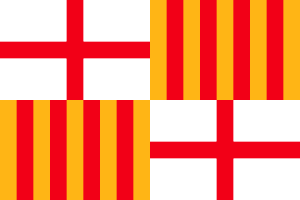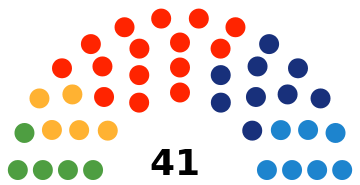Barcelona City Council election, 2003
Barcelona City Council election, 2003

|
|
|
|
All 41 seats in the Barcelona City Council
21 seats needed for a majority |
| Registered |
1,281,534  5.3% 5.3% |
| Turnout |
759,197 (59.2%)
 7.7 pp 7.7 pp |
| |
First party |
Second party |
Third party |
| |
.jpg) |
.jpg) |
.jpg) |
| Leader |
Joan Clos |
Xavier Trias |
Alberto Fernández Díaz |
| Party |
PSC |
CiU |
PPC |
| Leader since |
26 September 1997 |
25 April 2002 |
16 July 2002 |
| Last election |
20 seats, 45.2% |
10 seats, 21.7% |
6 seats, 14.9% |
| Seats won |
15 |
9 |
7 |
| Seat change |
 5 5 |
 1 1 |
 1 1 |
| Popular vote |
254,223 |
162,010 |
121,991 |
| Percentage |
33.6% |
21.4% |
16.1% |
| Swing |
 11.6 pp 11.6 pp |
 0.3 pp 0.3 pp |
 1.2 pp 1.2 pp |
|
| |
Fourth party |
Fifth party |
| |
 |
 |
| Leader |
Jordi Portabella |
Imma Mayol |
| Party |
ERC |
ICV–EUiA |
| Leader since |
1999 |
1998 |
| Last election |
3 seats, 6.5% |
2 seats, 7.6%[lower-alpha 1] |
| Seats won |
5 |
5 |
| Seat change |
 2 2 |
 3 3 |
| Popular vote |
96,868 |
91,286 |
| Percentage |
12.8% |
12.1% |
| Swing |
 6.3 pp 6.3 pp |
 4.4 pp 4.4 pp |
|
|
|
The 2003 Barcelona City Council election was held on Sunday, 25 May 2003, to elect the 7th Barcelona City Council, the unicameral local legislature of the municipality of Barcelona. At stake were all 41 seats in the City Council, determining the Mayor of Barcelona.
Electoral system
The number of seats in the Barcelona City Council was determined by the population count. According to the municipal electoral law, the population-seat relationship on each municipality was to be established on the following scale:
| Inhabitants |
Seats |
| <250 |
5 |
| 251–1,000 |
7 |
| 1,001–2,000 |
9 |
| 2,001–5,000 |
11 |
| 5,001–10,000 |
13 |
| 10,001–20,000 |
17 |
| 20,001–50,000 |
21 |
| 50,001–100,000 |
25 |
Additionally, for populations greater than 100,000, 1 seat was to be added per each 100,000 inhabitants or fraction, according to the most updated census data, and adding 1 more seat if the resulting seat count gives an even number. As the updated population census for the 2003 election was 1,527,190, the Barcelona City Council size was set to 41 seats.
All City Council members were elected in a single multi-member district, consisting of the Barcelona municipality, using the D'Hondt method and a closed-list proportional representation system. Voting was on the basis of universal suffrage in a secret ballot. Only lists polling above 5% of valid votes in all of the municipality (which include blank ballots—for none of the above) were entitled to enter the seat distribution.
The Spanish municipal electoral law established a clause stating that, if no candidate was to gather an absolute majority of votes to be elected as mayor of a municipality, the candidate of the most-voted party would be automatically elected to the post.[1]
Results
|
Blank ballots |
12,679 | 1.68 |  0.21 0.21 |
|
| |
| Total |
756,567 | 100.00 | |
41 | ±0 |
| |
| Valid votes |
756,567 | 99.65 |  0.09 0.09 |
|
| Invalid votes |
2,630 | 0.35 |  0.09 0.09 |
| Votes cast / turnout |
759,197 | 59.24 |  7.71 7.71 |
| Abstentions |
522,337 | 40.76 |  7.71 7.71 |
| Registered voters |
1,281,534 | |
| |
| Source: Ministry of the Interior |
| Vote share |
|---|
|
|
|
|
|
| PSC-PM |
|
33.60% |
| CiU |
|
21.41% |
| PPC |
|
16.12% |
| ERC-AM |
|
12.80% |
| ICV-EUiA-EP |
|
12.07% |
| Others |
|
2.32% |
| Blank ballots |
|
1.68% |
| City council seats |
|---|
|
|
|
|
|
| PSC-PM |
|
36.59% |
| CiU |
|
21.95% |
| PPC |
|
17.07% |
| ERC-AM |
|
12.20% |
| ICV-EUiA-EPM |
|
12.20% |
Notes
References

.jpg)
.jpg)
.jpg)

